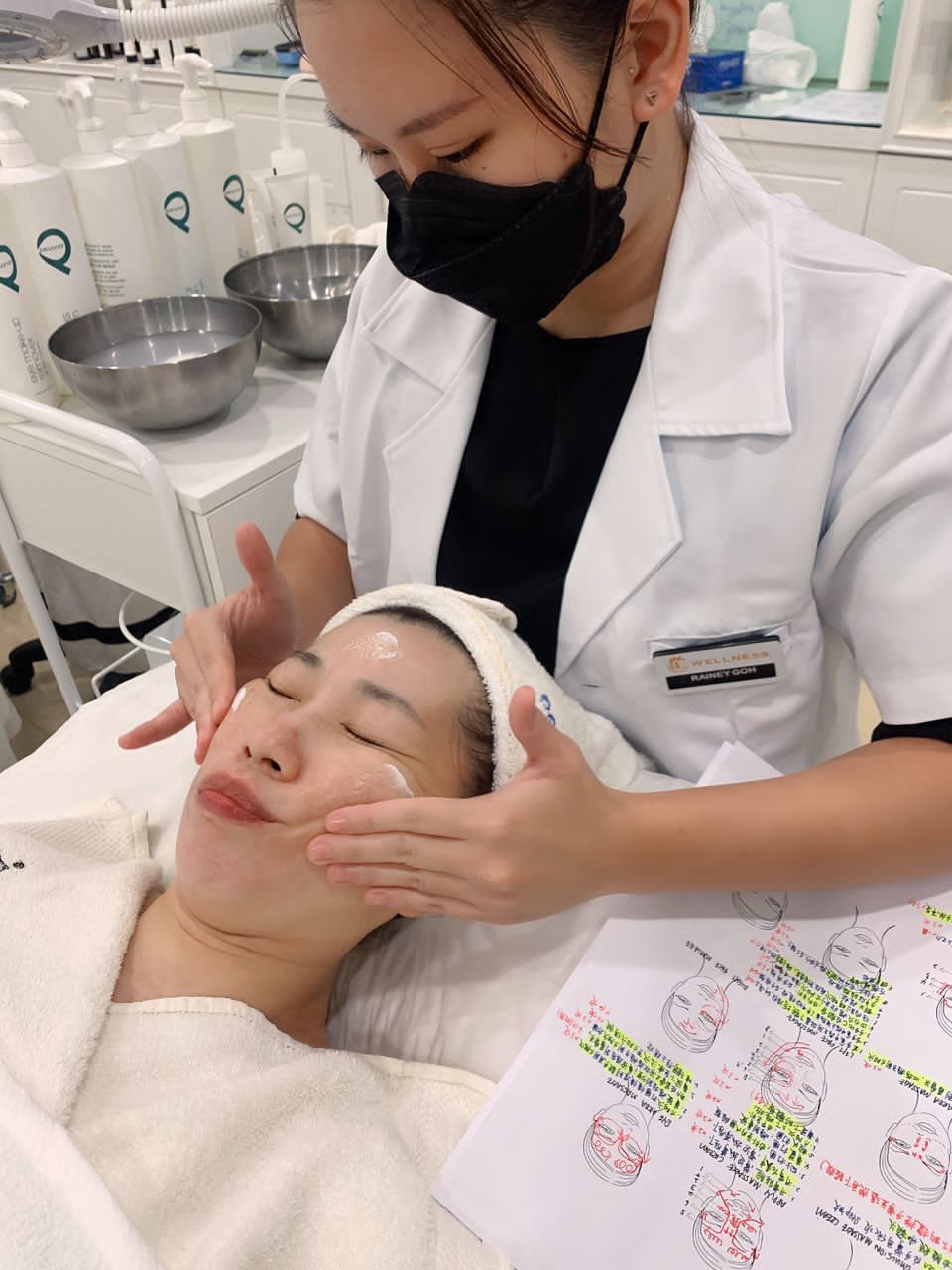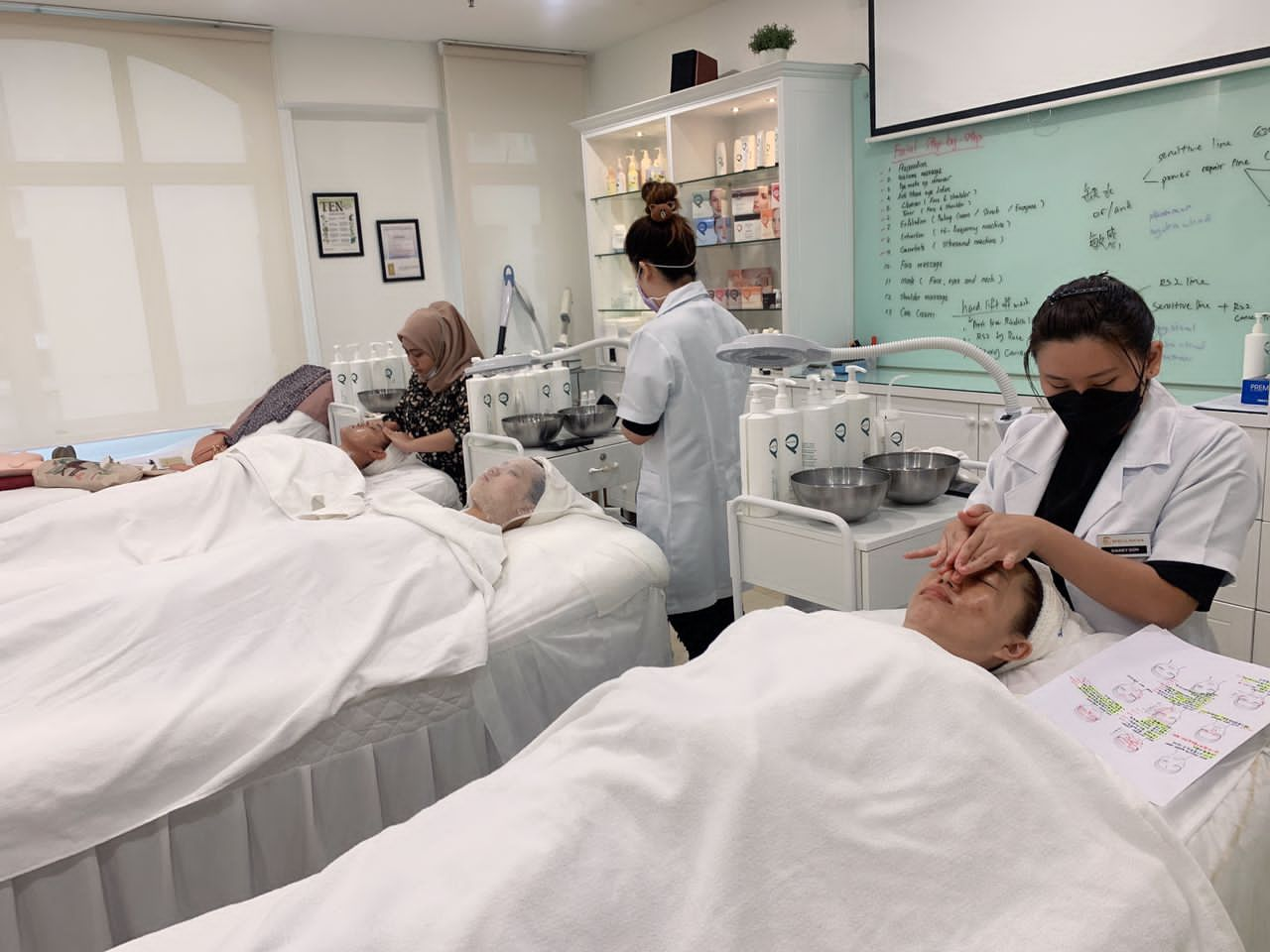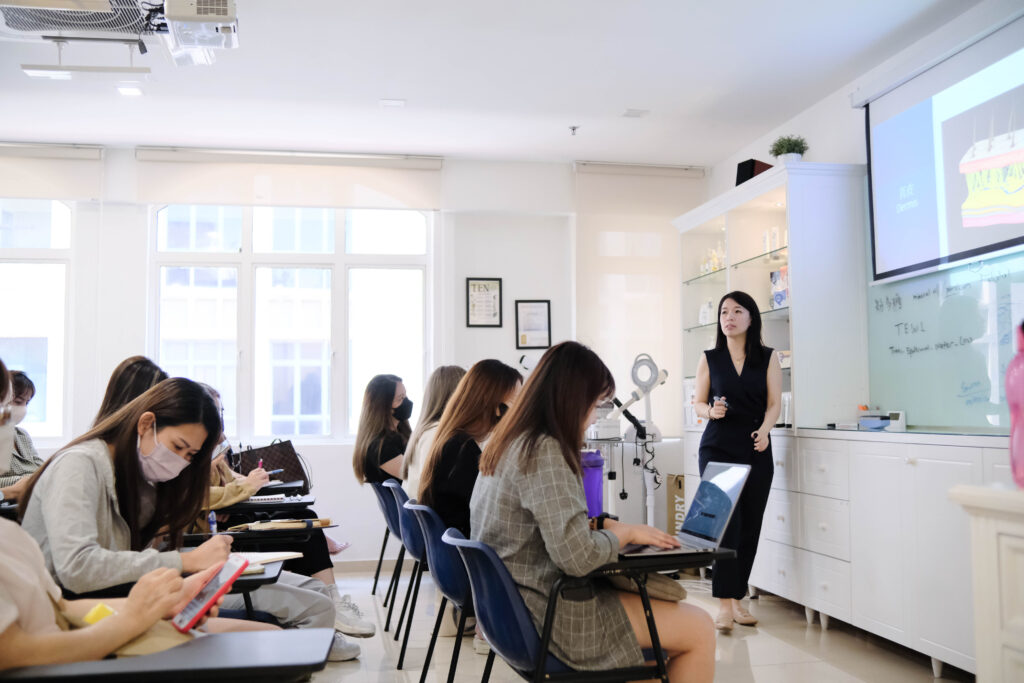HOME > ACADEMICS > PROFESSIONAL ESTHETICIAN FOUNDATION
PROFESSIONAL ESTHETICIAN FOUNDATION



Course Contents
PROFESSIONAL ESTHETICIAN FOUNDATION
This Professional Esthetician Foundation Course is designed for individuals aspiring to become skilled and knowledgeable professionals in the field of esthetics and beauty therapy. The course provides a solid foundation of theoretical knowledge and practical skills essential for a successful career as an esthetician.
✔ Skin anatomy and diagnosis
✔ Customer service and consultation skills
✔ Understanding skin problems and diseases
✔ Sensitive skin causes and solutions
✔ Addressing adult and teen acne
✔ Welcome massage technique
✔ Professional hands-on skills
✔ Exfoliation and extraction skills: comedones and pustules
✔ Comprehensive massage techniques (face, eye, decollete, shoulder)
✔ Professional mask application technique
✔ Serum and ampoule application technique
CERTIFICATES:
✔ BG International College (Foundation in Professional Esthetician)
✔ SKM
Course Duration
Course Fees
Frequently Asked Questions
The Professional Esthetician Foundation course at BG International College is designed to equip students with a strong foundational knowledge of skincare and beauty therapy. It covers essential skills needed for the beauty and wellness industry, including understanding skin anatomy, diagnosing skin issues, and performing various treatments such as exfoliation, extractions, and professional facials.
The program also includes practical training in customer service, client consultations, and hands-on treatments like waxing, makeup, and massage techniques. By the end of the course, students will have developed both theoretical and practical expertise, preparing them for further education or immediate entry into the beauty industry.
In the Professional Esthetician Foundation course at BG International College, skin anatomy and diagnosis are essential components of the curriculum. Students are trained to understand the structure and function of the skin, which includes learning about the different layers (epidermis, dermis, and subcutaneous tissue) and how these layers impact skin health and treatments.
The course emphasizes the importance of diagnosing skin types and conditions, teaching students how to identify various skin concerns such as acne, dehydration, and sensitivity. This knowledge enables them to perform accurate client consultations and recommend personalized treatments. Additionally, students learn about the physiological factors that affect the skin, such as aging, environmental damage, and genetics.
This theoretical knowledge is complemented by hands-on practice, allowing students to apply their understanding in real-world scenarios.
Customer service and consultation skills are vital for estheticians for several reasons:
- Building Client Trust and Loyalty: A positive customer experience is key to establishing long-term relationships. Good communication, professionalism, and active listening during consultations help build trust, making clients feel valued and understood. This, in turn, increases the likelihood of repeat business and referrals.
- Personalized Treatment Plans: Consultations allow estheticians to assess the client’s skin type, concerns, and preferences accurately. By gathering this information, they can tailor treatments and recommend suitable products, ensuring better results and higher client satisfaction.
- Handling Client Concerns: Proper customer service skills enable estheticians to address any client questions or complaints effectively. This enhances the overall client experience, making them feel confident in the esthetician’s abilities and fostering a professional relationship.
- Boosting Business Growth: Estheticians with strong consultation and customer service skills often contribute to business growth by providing an elevated service experience. Happy clients tend to leave positive reviews and recommend the service to others, which is beneficial for the business.
In summary, these skills are essential not just for delivering effective treatments but also for cultivating a successful and client-centered practice.
The Professional Esthetician Foundation course at BG International College helps students understand skin problems and diseases through both theoretical instruction and practical application. The course covers:
- Skin Anatomy and Function: Students learn the detailed structure and layers of the skin, which helps them understand how skin conditions such as acne, eczema, and rosacea develop. This knowledge is essential for diagnosing issues and determining appropriate treatments.
- Common Skin Conditions: The curriculum includes education on various skin diseases and disorders, such as pigmentation issues, aging signs, and inflammatory conditions. Students are trained to recognize the symptoms and causes of these conditions, enabling them to identify them during client consultations.
- BG Diagnosis and Treatment: The course equips students with the skills to assess skin health accurately. They learn to perform thorough skin analyses, taking into account factors such as environmental damage, genetics, and lifestyle. Based on their diagnosis, they recommend personalized treatments and skincare routines that address specific skin issues.
By combining theoretical knowledge with hands-on experience, the course prepares students to effectively manage and treat a variety of skin problems.
In the Professional Esthetician Foundation course at BG International College, various solutions for sensitive skin are covered to help estheticians manage this common skin concern. Key approaches include:
- Product Knowledge: Students are trained to identify and recommend skincare products specifically designed for sensitive skin. This includes products free of irritants like fragrances, alcohol, and harsh chemicals that could exacerbate sensitivity.
- Gentle Treatment Techniques: The course emphasizes the use of non-invasive and gentle treatment methods, such as mild exfoliants and soothing facials. Students learn how to handle sensitive skin delicately to avoid triggering reactions like redness or inflammation.
- Customized Care: Estheticians are taught to tailor skincare routines and treatments based on the individual client’s needs, such as using calming ingredients like aloe vera, chamomile, or colloidal oatmeal that soothe and hydrate sensitive skin.
- Education on Skin Triggers: Students also learn to educate clients about potential external triggers for sensitive skin, including environmental factors and lifestyle choices. This allows estheticians to provide holistic care that goes beyond in-salon treatments.
These solutions ensure that estheticians are well-prepared to treat sensitive skin safely and effectively.
The Professional Esthetician Foundation course at BG International College addresses both adult and teen acne by equipping students with the skills and knowledge to assess and treat acne effectively. Key areas of focus include:
- Skin Analysis and Diagnosis: Students learn to identify the root causes of acne, such as hormonal imbalances, excess sebum production, and clogged pores. They are trained to differentiate between the types of acne that are more common in teens, such as hormonal acne, and adult acne, which can be triggered by stress or environmental factors.
- Targeted Treatments: The course covers specific treatments designed to address acne, including exfoliation, extractions, and the use of masks and serums with acne-fighting ingredients like salicylic acid and benzoyl peroxide. These treatments are tailored to the severity of the acne and the client’s skin type.
- Education on Skincare Routines: Students are trained to advise clients on proper skincare routines to manage acne at home. This includes recommending non-comedogenic products and guiding clients on the importance of a consistent regimen to prevent flare-ups.
- Holistic Approach: The course also emphasizes a holistic understanding of acne, considering factors such as diet, stress, and lifestyle that can influence skin health. This helps estheticians provide comprehensive care for both teens and adults dealing with acne.
By focusing on both treatment and prevention, the course ensures that students are well-prepared to address acne concerns for a wide range of clients.
In the Professional Esthetician Foundation course at BG International College, students are trained in various techniques for exfoliation and extraction of comedones (blackheads and whiteheads) and pustules. Key techniques include:
- Manual Exfoliation: Students learn to use physical scrubs with fine particles or brushes to remove dead skin cells from the surface, helping to prevent clogged pores and promoting skin cell turnover. This prepares the skin for extractions by softening the comedones.
- Chemical Exfoliation: The course covers the application of mild chemical exfoliants like alpha hydroxy acids (AHAs) and beta hydroxy acids (BHAs), which penetrate deeper into the skin to dissolve dead cells and sebum buildup in the pores. These methods are particularly effective for acne-prone skin and help reduce comedones and pustules.
- Extraction Techniques: Students are taught safe and hygienic extraction methods for removing comedones and pustules. This includes the use of sterile tools such as comedone extractors and applying gentle pressure to avoid damaging the surrounding skin. Techniques for minimizing irritation and infection post-extraction are also emphasized.
- Steaming and Prepping the Skin: Prior to extractions, students learn to use steam or warm towels to open the pores and soften the skin, making the extraction process smoother and reducing discomfort for the client.
These techniques ensure that students can perform exfoliation and extraction safely and effectively, improving the appearance of the skin and preventing future breakouts.
The Professional Esthetician Foundation course at BG International College covers a range of basic facial massage techniques that are essential for skincare treatments. These include:
- Effleurage: A gentle, gliding stroke often used at the beginning and end of the facial massage. This technique helps to relax the client, improve blood circulation, and prepare the skin for deeper techniques.
- Petrissage: This involves kneading and lifting the skin and underlying muscles. It helps to stimulate circulation, improve skin elasticity, and promote lymphatic drainage, making it effective for reducing puffiness and tension.
- Tapotement: A light tapping or percussion movement performed with the fingertips. It is used to stimulate the skin and underlying muscles, promoting a refreshed appearance.
- Friction: Circular movements applied with varying pressure to warm the skin and loosen tight tissues. This technique can help in reducing the appearance of fine lines and improving skin texture.
- Lymphatic Drainage Massage: This specialized technique focuses on stimulating the lymphatic system to remove toxins and reduce swelling. It’s particularly useful for clients with sensitive or acne-prone skin, as it promotes healing and reduces inflammation.
These techniques help estheticians deliver a relaxing and effective facial treatment, promoting skin health and rejuvenation.
In the Professional Esthetician Foundation course at BG International College, students learn professional mask application techniques through a combination of theoretical instruction and hands-on practice. Key aspects of the training include:
- Understanding Mask Types: Students are introduced to a variety of facial masks, such as clay masks for oily skin, hydrating masks for dry skin, and soothing masks for sensitive skin. They learn how to choose the right mask based on a client’s skin type and specific concerns.
- Application Techniques: The course covers precise application methods to ensure even coverage and optimal absorption. Students are trained to use tools like spatulas or brushes for a hygienic application and are taught the importance of applying masks in a consistent, even layer to maximize effectiveness.
- Timing and Removal: Proper mask timing is emphasized, as students learn how long each mask should be left on the skin for the best results. They also practice gentle removal techniques to avoid irritating the skin post-treatment.
- Customizing Mask Treatments: Instructors guide students in tailoring masks to individual clients’ needs, such as mixing serums or essential oils into a base mask to address multiple skin concerns at once.
By mastering these techniques, students become skilled in providing effective and personalized facial treatments.
In the Professional Esthetician Foundation course at BG’s International College, students are taught several key techniques for the application of serums and ampoules. These include learning how to properly distribute the product across the skin using precise, gentle motions to maximize absorption and ensure even coverage. The course emphasizes professional, hands-on application methods, which involve applying these skincare products with a focus on hygiene, pressure control, and enhancing product penetration for optimal skincare benefits.
The techniques are often paired with massage movements that aid in relaxation and product efficacy, preparing students to deliver high-quality treatments in a professional setting.
